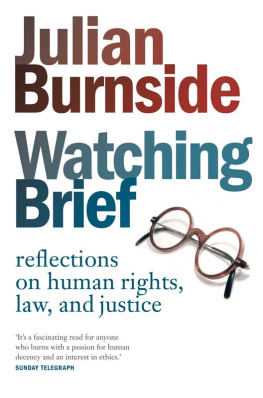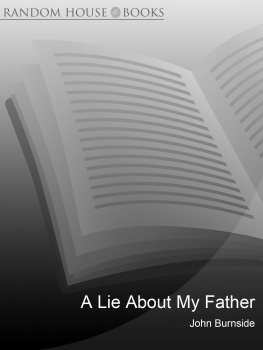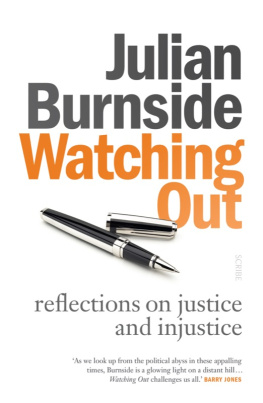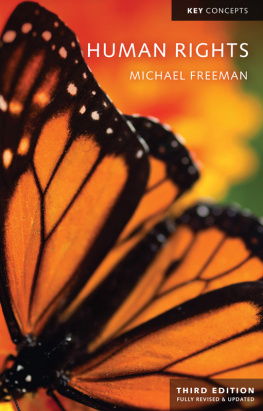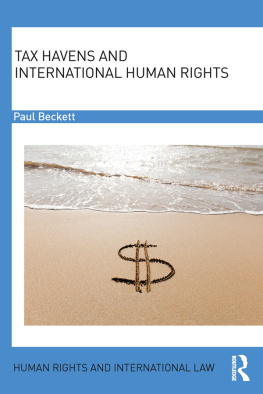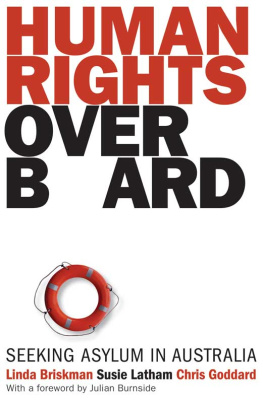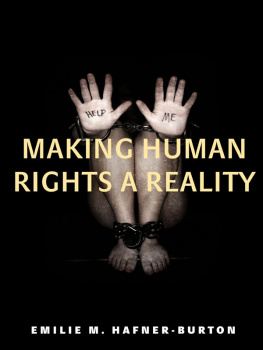
Scribe Publications
WATCHING BRIEF
Julian Burnside, QC, is an Australian barrister who specialises in commercial litigation and is also deeply involved in human rights work, in particular in relation to refugees. He is president of Liberty Victoria, and is also passionately involved in the arts: he is the chair of the Melbourne arts venue fortyfivedownstairs, and is chair of the Mietta Foundation. He has published a childrens book, Matilda and the Dragon , and is also the author of From Nothing to Zero , a compilation of letters written by asylum-seekers held in Australias detention camps, and Wordwatching , a collection of essays on the uses and abuses of the English language.
To Mosa Kadirie
Life, liberty, and the pursuit of happiness
Scribe Publications Pty Ltd
PO Box 523
Carlton North, Victoria, Australia 3054
Email: info@scribepub.com.au
First published by Scribe 2007
Reprinted 2007, 2008
Copyright Julian Burnside 2007
All rights reserved. Without limiting the rights under copyright reserved above, no part of this publication may be reproduced, stored in or introduced into a retrieval system, or transmitted, in any form or by any means (electronic, mechanical, photocopying, recording or otherwise) without the prior written permission of the publisher of this book.
Cover design by Sandy Cull, gogoGingko
National Library of Australia
Cataloguing-in-Publication data
Burnside, Julian.
Watching brief : reflections on human rights, law, and justice.
9781921753855 (e-book.).
1. Human rights. 2. Justice, Administration of. 3. Ethics. 4. Law. I. Title.
www.scribepublications.com.au
Contents
Preface
Part I
Foundations
1 School Days
2 The Practice of Law: justice, or just a job?
Part II
Asylum-seekers in Australia
Introduction
3 Authoritarianism in the Name of Freedom
4 Towards a Just Society: beyond the spin
5 Australias Crimes Against Humanity: not interesting
6 The Pacific Solution
7 Tony Abbott: master of the soft sell
8 Honesty Matters: the ethics of daily life
9 Australias Refugee Policy
Part III
Human Rights in an Age of Terror
Introduction
10 Terror, Old and New: from the Gunpowder Plot to Guantnamo
11 Human Rights and International Law
12 Protecting Rights in a Climate of Fear
13 David Hicks: hearsay and coercion
14 The Argument for a Bill of Rights
Habeas Corpus
16 The Dreyfus Affair
17 Anti-Terror Laws: controlling Jack Thomas
18 Howards Fair Go Australia
Part IV
Justice and Injustice
Introduction
19 Access to Justice
20 Van Nguyen: Australia and the death penalty
21 The Roger Casement Case
22 The Leopold and Loeb Case
23 The Oscar Slater Case
24 The Adolf Beck Case
25 The Stefan Kiszko Case
26 The Burning Car Case
27 The Scottsboro Boys Case
28 The Dred Scott Case
29 The Crippen Case
30 The Alma Rattenbury Case
31 The Black Book Case
Appendixes
I. Article 5 of the Constitution of Nauru: protection of personal liberty
II. Sections 198B and 494B of Australias Migration Act
III. The Third Geneva Convention relative to the Treatment of Prisoners of War [1949]
Notes
Acknowledgments
Preface
one way or another, the essays and speeches in this book are all about justice. Some of them are concerned with the idea of justice; others with the pursuit of justice; others with the functioning of the justice system.
This book explores some of these themes: how do we decide what is just? What can be done about unjust laws? How can the performance of the justice system be improved? Because it is an edited collection of essays and speeches that, for the most part, I have written over the past several years, the coverage of these topics is not uniform or comprehensive. This is not a textbook. But I hope it will stimulate some readers to think more deeply about the subject of justice generally, because creating and living in a just society is one of the highest aspirations of civilised people.
Because the facts surrounding Australias treatment of asylum-seekers have changed so much over the past seven years, it is important to note that the facts are to be understood as accurate at the time of writing, but have most likely changed by now. So, for instance, the number of boat people arriving in Australia has fallen significantly since the establishment of a (relatively) stable government in Afghanistan, changed conditions in Iraq, greater co-operation with Indonesia, and the drowning of 353 boat-people on 19 October 2001. Conditions in detention centres have changed. Woomera has closed; Baxter, which replaced Woomera in 2002, was closed in August 2007 after having been mothballed for some time. The essays concerning asylum-seekers should thus be understood as markers in a course of events during which a great deal changed although, depressingly, the fact of mandatory detention has not changed.
apologia
The essays in this book arise out of a fairly distinct period in my life. It has been the most satisfying time of my life so far. It has been marked by a peripheral involvement in politics because human rights issues, notably the treatment of asylum-seekers, intersect with politics. My involvement has included taking a public stance, something I had not previously done. This introduced me to a new dimension of personal discomfort. Having views is one thing; expressing them publicly and persistently opens you to personal attack and vilification. I had not expected this, because it was a new activity for me.
The personal attacks came from three main directions: professional colleagues, the pro-Howard commentariat, and Liberal Party parliamentarians.
Among some professional colleagues, I noticed a coolness from some people I had thought of as friends. Some invitations stopped coming; some colleagues no longer sought out my company; some whispered about my motives. It was disappointing and on occasions disturbing. I recall vividly an encounter with the wife of a colleague at a social function. She asked me archly whether I thought it appropriate that a member of the Bar should comment publicly on matters like this. I was surprised, and asked whether she thought it appropriate to know about things like this and remain silent. The conversation ended there.
On one occasion I was interviewed by a junior solicitor who wanted to write an article about Spare Lawyers for Refugees, a pro bono group of lawyers I had put together. The solicitor was employed by a national law firm. When the article was published, he sent me a copy and explained that it did not have his name on it: a partner at the firm thought it would be undesirable for the firms name to be associated with an article which mentioned me, because the firm does a lot of government work. This was a disturbing confirmation of something I had suspected for some time: so long as my views were so sharply opposed to the government, I was to be avoided in public.
By early 2005, public disquiet with the treatment of asylum-seekers had spread to the extent that Petro Georgiou was able to push through some needed reforms. Professional anxiety about my position evaporated at about the same time.
The Howard fan club in the media (Andrew Bolt, Piers Akerman, Gerard Henderson, Alan Jones, etc.) attacked me when they could. This was always predictable, misinformed, erroneous, and comforting. The vigour and frequency of their attacks was a fair indication that I was on the right track. I am grateful to each of them for guiding me this way, although I am confident that they did not intend the help they gave me.
Next page
